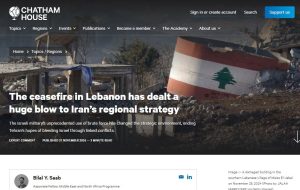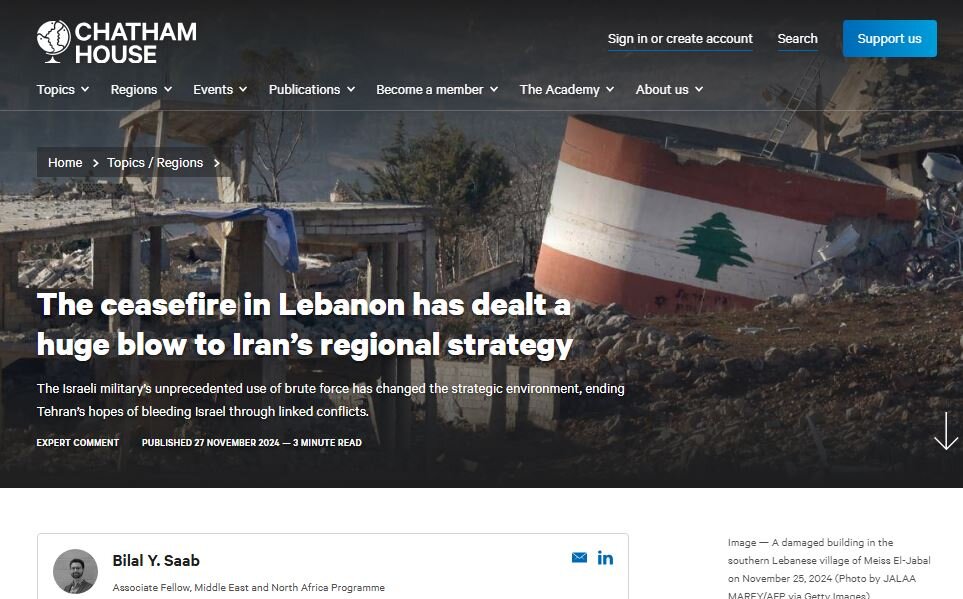Regional strategy of Iran stands firm despite minor setbacks
TEHRAN – Despite continuous Israeli attacks targeting Iran’s military doctrine in the wake of the regime’s brutal war in Gaza, the framework of that strategy remains largely intact and continues to operate across West Asia. In a recent article for Chatham House Bilal Y.Saab argues that “the ceasefire in Lebanon has dealt a huge blow


TEHRAN – Despite continuous Israeli attacks targeting Iran’s military doctrine in the wake of the regime’s brutal war in Gaza, the framework of that strategy remains largely intact and continues to operate across West Asia.
In a recent article for Chatham House Bilal Y.Saab argues that “the ceasefire in Lebanon has dealt a huge blow to Iran’s regional strategy”. However, the article fails to fully consider the current and delayed impacts of “Israel’s unprecedented use of brute force” on Tel Aviv.
The military operations in the Gaza Strip and Lebanon have currently put huge burdens on the Israeli economy with long-term impacts expected to last for years. While unconditional U.S. aid might temporarily alleviate investor concerns regarding Israel, the potential for renewed conflict poses a significant and lasting deterrent to investment.
The issue of settlers in northern occupied Palestine has not been yet solved and seems to be a problem in the foreseeable future for Israel. Also, the impacts of Israel’s action on Western public opinion cannot be undermined, this is being seen in some countries to put pressure on policymakers to take more progressive action against Israel.
The author argues that Israel has achieved victory in its war with Hezbollah but the facts on the ground suggest differently. Tel Aviv since October 2023 has been targeting Hezbollah facilities and fighters across Lebanon but to no avail. Hezbollah operations in northern occupied Palestine and even deeper in Haifa and Tel Aviv continued until the last moments before a ceasefire took effect last month. Israel’s “limited, targeted operations” in Southern Lebanon fell short of gaining significant territory and Hezbollah was successful in repelling those attacks.
The Lebanon ceasefire, largely mirroring UN Resolution 1701, offers no significant changes. Hezbollah retains its weaponry and maintains the capacity to resume operations against Israel at any time.
Bilal Y. Saab views the ceasefire as a setback for the Resistance Axis, arguing that it has left Hamas isolated. But this is not the case; factions in the Resistance Front have always contained autonomy in their decisions despite Western claims about Iran controlling it all. It is largely uncontested that Hamas started Operations Al-Aqsa Storm on its own without any prior notice to other groups and actors in the region yet, the whole front with a differentiating timetable joined Hamas in its fight against Israel.
For over a year, the conflict in Lebanon remained a relatively even exchange of attacks. Only after Israel significantly escalated its assaults, pursuing new objectives, none of which were achieved, did ceasefire talks commence. The ideology of creation of Hezbollah is based on confronting Israel and the current fragile ceasefire can be considered as a temporary tactical halt for the group in its fight against Tel Aviv.
Furthermore, Saab prescribes renewed efforts for normalization of relations between Arab countries and Israel for what he calls a “lasting victory” for Tel Aviv. Saudi Arabia is one of the main players in the region which is reportedly eager to normalize ties with Israel.
However, the regional landscape has shifted dramatically since the early Trump administration and the Abraham Accords. The Israeli onslaughts in Gaza and Lebanon have fueled widespread regional opposition to normalization with Israel. Also, Saudi Arabia’s rapprochement with Iran suggests a decreased likelihood of Arab confrontation with Tehran.
Despite the author’s claims that an expanded Abraham Accords would lead to a Palestinian state, Israel has intensified settlement expansion in the occupied West Bank, particularly since the formation of the current far-right cabinet. All these factors point to one issue and that is the impossibility of a deal being in favor of Palestinians.
Saab says “Iran also has to think twice about how Israel might react to even the attempt to resurrect its regional strategy.” However, Tehran’s response to Israeli provocations has been clear for over a year, any attack on Iran’s interests leads to retaliation.
Contrary to Israeli actions, Iran’s measured responses are not due to military concerns but rather reflect its defensive military doctrine—a fact often overlooked in Western assessments. Tehran does not seek regional war. Its doctrine which is based on two main pillars (inward and outward defense) has not wobbled despite being under constant attacks. Support for the Resistance Axis can be defined in outward defense and drone, missile advancements are in line with inward defense.
Should the regional status quo significantly change, Iran may employ alternative deterrent measures to counter threats to its national interests. This potential shift includes a reassessment of its nuclear doctrine, a subject of ongoing debate among Iranian scholars and policymakers.
